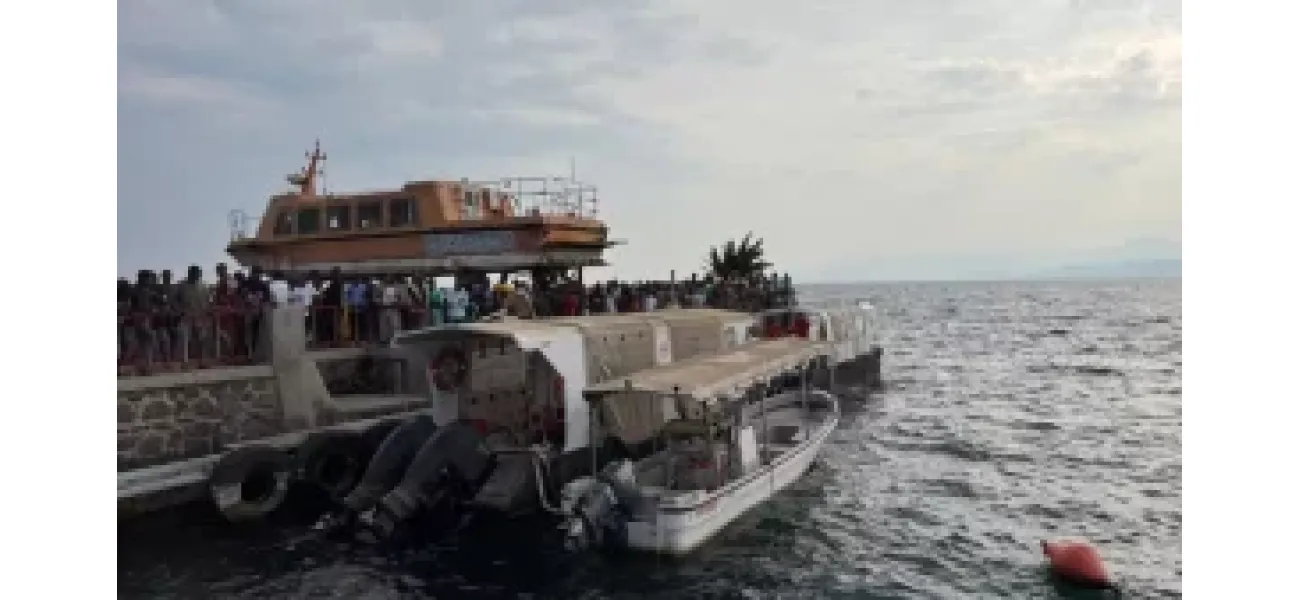Ferry accident in Congo's Busira river leaves 38 dead and more than 100 missing.
Tragedy in Congo as overloaded ferry capsizes, leaving 38 dead and over 100 missing. Boat sank just days after another accident.
December 22nd 2024.

In the bustling city of Kinshasa, the news of a tragic ferry accident has left the community in mourning. Reports from local officials and eyewitnesses have confirmed the devastating loss of 38 lives, with over 100 people still missing. The overloaded vessel, filled with individuals returning home for the Christmas holiday, capsized in the river Busira on a late Friday night. This tragedy comes just days after another ferry disaster in the northeast of Congo, which claimed the lives of 25 passengers.
Amidst the heartache and chaos, there is some glimmer of hope as 20 people have been rescued so far. The ferry was traveling in a convoy of other boats in the northeast of the country, with most of its passengers being merchants making their way back home for Christmas. Joseph Joseph Kangolingoli, the mayor of Ingende, the last town before the site of the accident, shared that the boat had made stops at two other ports before heading to Boende.
According to Ndolo Kaddy, a resident of Ingende, the ferry was carrying more than 400 people, making it a grave concern that there may be more casualties. This tragedy has once again raised questions about the safety measures for water transportation in Congo. Officials have repeatedly warned against overloading and promised consequences for those who do not follow safety protocols. However, in remote areas where most passengers come from, public transport is not always a viable option, and many are forced to take the risk with overloaded boats.
Unfortunately, this is not the first time that overloaded boats have claimed lives in Congo. In October, 78 people lost their lives in an accident in the east of the country, and just a few months prior, 80 people perished in a similar incident near Kinshasa. The recent disaster has sparked outrage towards the government for not equipping the convoy with proper flotation devices.
Nesty Bonina, a member of the local government in Mbandaka, the capital of the Equateur province where the ferry sank, expressed his disappointment with the authorities for not taking necessary precautions to prevent these accidents. He questioned how a boat could navigate at night without proper supervision and how the death toll continues to rise despite previous warnings.
Sadly, this type of tragedy is becoming all too common in Congo. With the ongoing conflicts between security forces and rebels, many people have turned to water transportation as a safer means of travel. However, these wooden boats are not equipped to handle the weight of passengers and their goods, leading to frequent accidents. As the roads are often blocked due to the clashes, many are left with no choice but to take the risk and board these overloaded vessels.
As the community mourns the loss of so many lives, it is clear that urgent action needs to be taken to prevent such tragedies from happening again. The Congolese government must prioritize the safety of its citizens and enforce stricter regulations for water transportation. Only then can we hope to avoid such devastating losses in the future.
Amidst the heartache and chaos, there is some glimmer of hope as 20 people have been rescued so far. The ferry was traveling in a convoy of other boats in the northeast of the country, with most of its passengers being merchants making their way back home for Christmas. Joseph Joseph Kangolingoli, the mayor of Ingende, the last town before the site of the accident, shared that the boat had made stops at two other ports before heading to Boende.
According to Ndolo Kaddy, a resident of Ingende, the ferry was carrying more than 400 people, making it a grave concern that there may be more casualties. This tragedy has once again raised questions about the safety measures for water transportation in Congo. Officials have repeatedly warned against overloading and promised consequences for those who do not follow safety protocols. However, in remote areas where most passengers come from, public transport is not always a viable option, and many are forced to take the risk with overloaded boats.
Unfortunately, this is not the first time that overloaded boats have claimed lives in Congo. In October, 78 people lost their lives in an accident in the east of the country, and just a few months prior, 80 people perished in a similar incident near Kinshasa. The recent disaster has sparked outrage towards the government for not equipping the convoy with proper flotation devices.
Nesty Bonina, a member of the local government in Mbandaka, the capital of the Equateur province where the ferry sank, expressed his disappointment with the authorities for not taking necessary precautions to prevent these accidents. He questioned how a boat could navigate at night without proper supervision and how the death toll continues to rise despite previous warnings.
Sadly, this type of tragedy is becoming all too common in Congo. With the ongoing conflicts between security forces and rebels, many people have turned to water transportation as a safer means of travel. However, these wooden boats are not equipped to handle the weight of passengers and their goods, leading to frequent accidents. As the roads are often blocked due to the clashes, many are left with no choice but to take the risk and board these overloaded vessels.
As the community mourns the loss of so many lives, it is clear that urgent action needs to be taken to prevent such tragedies from happening again. The Congolese government must prioritize the safety of its citizens and enforce stricter regulations for water transportation. Only then can we hope to avoid such devastating losses in the future.
[This article has been trending online recently and has been generated with AI. Your feed is customized.]
[Generative AI is experimental.]
0
0
Submit Comment





